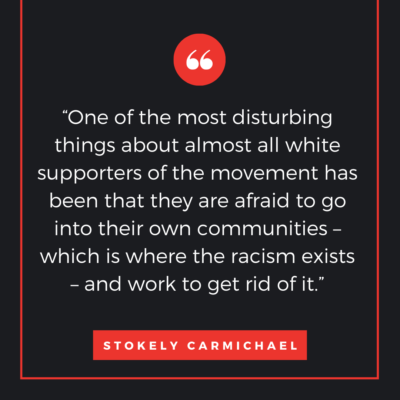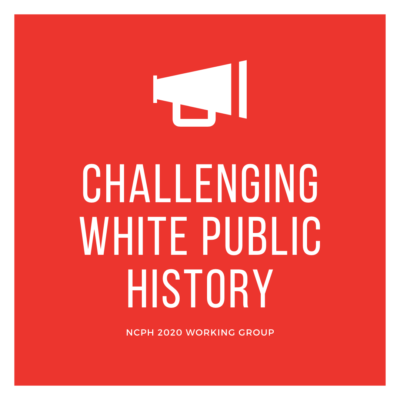Calling on Public Historians: Challenging White Public History Working Group
07 May 2020 – Lara Kelland and Abigail Gautreau
Editors’ Note: This working group session did not take place in Atlanta as described below, but the National Council on Public History working group Challenging White Public History is still active and working on deliverables. They plan to report back soon on their ongoing virtual activities.
As members of the 2020 National Council on Public History working group Challenging White Public History, we believe that in order for NCPH to truly achieve its goals regarding inclusion, white NCPH members must begin at home by making efforts toward allyship, doing the emotional labor of racial justice work, and cultivating the skills to call one another in, rather than call one another out. The idea for this working group emerged at the 2019 NCPH Annual Meeting when facilitators began processing a disturbing trend they had observed in interactions between white public historians and public historians of color at NCPH. We asked ourselves, how can white public historians work toward getting rid of racism and promoting racial justice, as Civil Rights leader Stokely Carmichael once suggested?
At the 2019 Annual Meeting in Hartford, Connecticut, the public plenary, “Considering Coltsville: A Revolving Story,” sparked conversation. The event involved a panel of community leaders discussing the impact of the Coltsville National Historic Park, which celebrates the history of gun manufacturing in a city and neighborhood where gun violence is a real threat. The speakers repeatedly called the audience to action, most memorably when Warren Hardy, founder of Helping Young People Evolve (HYPE) and a youth development professional, exhorted us that, “There’s a challenge in that, did you hear it? Heroes aren’t neutral. Radical love isn’t neutral. Where do we sit in that?” Shortly after that, Rev. Henry Brown reminded the audience that “It’s easy to tell someone that you love them, but it’s your actions that show them you mean it.” We formed this Working Group to decide on some of those actions.
Even before question time began, some white audience members on Twitter began asking why the panelists weren’t addressing national gun violence and the NRA, which was explicitly not the panel’s purpose. Some white audience members again used question time to center their own experiences. As we watched and listened, we were reminded of panel discussions led by public historians of color in which white audience members derailed presentations with question-comments on their own work. We thought of instances when our female colleagues of color asked questions of white male panelists, only to be dismissed.
As we processed our experiences, we were reminded of Stokely Carmichael’s words in his 1966 article, “What We Want”:

Image courtesy Abigail Gautreau.
We are a group of fourteen enthusiastic public historians, at all stages in our careers, who are committed to racial justice in our shared profession. Some are practitioners and others are more centered in public history education. As such, we are able to reflect on our positions in a variety of cultural organizations and academic settings. We seek to do this work alongside others in a national and even transnational movement to undo white supremacy and white privilege, akin to the community organizing work of Showing Up for Racial Justice (SURJ). Far too often, institutional diversity and inclusion initiatives focus primarily on attracting more people of color, LGBTQIA, people with disabilities, and other marginalized populations. These new hires are then implicitly burdened with changing an entrenched institutional culture that they did not create, while coping with day-to-day micro- and sometimes macro-aggressions from colleagues and potentially the public.
This group’s core vision is that white people are charged with undoing white supremacy. We are committed to creating an open, honest space where we can learn to do better in our professional and civic relationships. Starting with ourselves, we want to build on the concept of self-reflection to push white public historians to develop the tools for understanding how white supremacy has informed their perspectives, emotions, and interpersonal styles, with an eye toward how we can help to dismantle white supremacy.

Image courtesy Abigail Gautreau.
But the how of this work is challenging, slow-going, and complex, and it won’t end within the confines of participation in a single working group. Robin DiAngelo, coauthor of White Fragility: Why It’s So Hard For White People To Talk About Racism (2018), argues that “Interrupting the forces of racism is ongoing, lifelong work because the forces conditioning us into racist frameworks are always at play.” We acknowledge the vastness of this work, but we seek to cultivate a basic set of skills in ourselves that will help us lovingly and humbly, yet forcefully interrupt white supremacy.
Participants have written individual case statements reflecting on what brings them to this work. We are also reading key works by authors such as poet and teacher Layla Saad, sociologist Michael Eric Dyson, and others. In addition to reading one another’s case statements and identifying themes that will be taken up in small group work, our larger hope is to promote dialogue about racial dynamics in public history work and redirect conversations that center white experiences at the cost of silencing the work of public historians of color.
In our interactions leading up to the conference and during the working group itself, those of us who identify as white will be called on to reflect on our own privilege with the goal of undoing racial hierarchy in our professional spaces. We will not be talking much, if at all, about public history projects because this working group is intended to address racial dynamics in our own organizations.
At the conference, we begin with conversations among those of us who have formed the working group. We also will make space for including audience members who are navigating the difficult terrain of undoing white supremacy in their own professional spaces. We encourage any interested conference participants to join us for the conversation on Thursday, March 19, from 1:30-3:30 in Chastain E. We ask that rather than livetweeting the session, participants and audience members engage reflectively and holistically after the group meets.
~Abigail R. Gautreau is an Assistant Professor of History at Grand Valley State University.
~lara kelland is a public history educator and scholar of oppositional and grassroots collective memory. She directs the Museum Studies, Heritage, and Public History MA program at the University of Missouri-St. Louis and is the author of Clio’s Foot Soldiers: Twentieth Century U.S. Social Movements and Collective Memory (UMass 2018).



